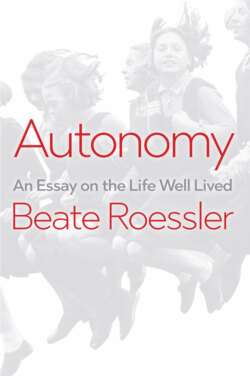Читать книгу Autonomy - Beate Roessler - Страница 23
Autonomy and the acceptance of conflicts
ОглавлениеI said at the outset that this chapter is concerned with the question of whether and how we can deal with our everyday experiences of ambivalence from the perspective of autonomy, and that I am interested in the full spectrum of a concept of ambivalence. By now I think it should be clear that theories that seek to banish ambivalence entirely from the network of desires, reflections, and reasons that guide our actions are rather unconvincing, but that an autonomous person nonetheless must stand behind her actions, at least in the sense that she not vacillate or constantly fall into uncertainty. Even if an autonomous person has an ambivalent self, she knows what she wants with the necessary clarity. Thus she must be sufficiently sovereign in coping with her ambivalences. She must be able to make decisions and not confuse ambivalence with skepticism. Once she has decided on a course of action, she can accept her conflicting desires and the reasons in favor of the rejected option without necessarily becoming skeptical of her choice.45
We have seen that there are many different possible ways to deal with ambivalences. We can integrate, tolerate, accept, or compartmentalize them. We can reconcile them with each other, make compromises, or try to switch between identities. These are all possible strategies for coping reasonably with ambivalences, and they are more realistic and more suitable for daily life than strategies of externalization. Autonomy, then, can straightforwardly be understood as reasonably and adequately coping with ambivalences, with the irreconcilability and contingency of desires and possibilities, with the complexity of the question of how we want to live. Of course, we are not always ambivalent, nor are we ambivalent in every area of our lives. But when and where we are, this does not make us irrational or heteronomous. Calmly (like Frank Bascombe) coming to terms with ambivalent conflicts, emotions, decisions, finitude – that is, coming to terms with ourselves – thus clearly appears to be an expression of autonomy. These ambivalences do not stand in the way of a self-determined, well-lived life.
